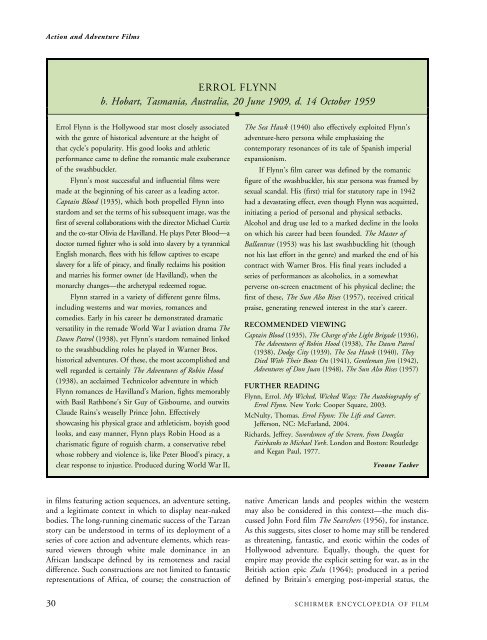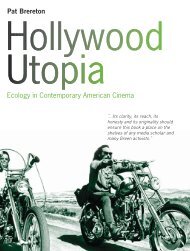Schirmer Encyclopedia of Film
Schirmer Encyclopedia of Film
Schirmer Encyclopedia of Film
You also want an ePaper? Increase the reach of your titles
YUMPU automatically turns print PDFs into web optimized ePapers that Google loves.
Action and Adventure <strong>Film</strong>s<br />
ERROL FLYNN<br />
b. Hobart, Tasmania, Australia, 20 June 1909, d. 14 October 1959<br />
Errol Flynn is the Hollywood star most closely associated<br />
with the genre <strong>of</strong> historical adventure at the height <strong>of</strong><br />
that cycle’s popularity. His good looks and athletic<br />
performance came to define the romantic male exuberance<br />
<strong>of</strong> the swashbuckler.<br />
Flynn’s most successful and influential films were<br />
made at the beginning <strong>of</strong> his career as a leading actor.<br />
Captain Blood (1935), which both propelled Flynn into<br />
stardom and set the terms <strong>of</strong> his subsequent image, was the<br />
first <strong>of</strong> several collaborations with the director Michael Curtiz<br />
and the co-star Olivia de Havilland. He plays Peter Blood—a<br />
doctor turned fighter who is sold into slavery by a tyrannical<br />
English monarch, flees with his fellow captives to escape<br />
slavery for a life <strong>of</strong> piracy, and finally reclaims his position<br />
and marries his former owner (de Havilland), when the<br />
monarchy changes—the archetypal redeemed rogue.<br />
Flynn starred in a variety <strong>of</strong> different genre films,<br />
including westerns and war movies, romances and<br />
comedies. Early in his career he demonstrated dramatic<br />
versatility in the remade World War I aviation drama The<br />
Dawn Patrol (1938), yet Flynn’s stardom remained linked<br />
to the swashbuckling roles he played in Warner Bros.<br />
historical adventures. Of these, the most accomplished and<br />
well regarded is certainly The Adventures <strong>of</strong> Robin Hood<br />
(1938), an acclaimed Technicolor adventure in which<br />
Flynn romances de Havilland’s Marion, fights memorably<br />
with Basil Rathbone’s Sir Guy <strong>of</strong> Gisbourne, and outwits<br />
Claude Rains’s weaselly Prince John. Effectively<br />
showcasing his physical grace and athleticism, boyish good<br />
looks, and easy manner, Flynn plays Robin Hood as a<br />
charismatic figure <strong>of</strong> roguish charm, a conservative rebel<br />
whose robbery and violence is, like Peter Blood’s piracy, a<br />
clear response to injustice. Produced during World War II,<br />
in films featuring action sequences, an adventure setting,<br />
and a legitimate context in which to display near-naked<br />
bodies. The long-running cinematic success <strong>of</strong> the Tarzan<br />
story can be understood in terms <strong>of</strong> its deployment <strong>of</strong> a<br />
series <strong>of</strong> core action and adventure elements, which reassured<br />
viewers through white male dominance in an<br />
African landscape defined by its remoteness and racial<br />
difference. Such constructions are not limited to fantastic<br />
representations <strong>of</strong> Africa, <strong>of</strong> course; the construction <strong>of</strong><br />
The Sea Hawk (1940) also effectively exploited Flynn’s<br />
adventure-hero persona while emphasizing the<br />
contemporary resonances <strong>of</strong> its tale <strong>of</strong> Spanish imperial<br />
expansionism.<br />
If Flynn’s film career was defined by the romantic<br />
figure <strong>of</strong> the swashbuckler, his star persona was framed by<br />
sexual scandal. His (first) trial for statutory rape in 1942<br />
had a devastating effect, even though Flynn was acquitted,<br />
initiating a period <strong>of</strong> personal and physical setbacks.<br />
Alcohol and drug use led to a marked decline in the looks<br />
on which his career had been founded. The Master <strong>of</strong><br />
Ballantrae (1953) was his last swashbuckling hit (though<br />
not his last effort in the genre) and marked the end <strong>of</strong> his<br />
contract with Warner Bros. His final years included a<br />
series <strong>of</strong> performances as alcoholics, in a somewhat<br />
perverse on-screen enactment <strong>of</strong> his physical decline; the<br />
first <strong>of</strong> these, The Sun Also Rises (1957), received critical<br />
praise, generating renewed interest in the star’s career.<br />
RECOMMENDED VIEWING<br />
Captain Blood (1935), The Charge <strong>of</strong> the Light Brigade (1936),<br />
The Adventures <strong>of</strong> Robin Hood (1938), The Dawn Patrol<br />
(1938), Dodge City (1939), The Sea Hawk (1940), They<br />
Died With Their Boots On (1941), Gentleman Jim (1942),<br />
Adventures <strong>of</strong> Don Juan (1948), The Sun Also Rises (1957)<br />
FURTHER READING<br />
Flynn, Errol. My Wicked, Wicked Ways: The Autobiography <strong>of</strong><br />
Errol Flynn. New York: Cooper Square, 2003.<br />
McNulty, Thomas. Errol Flynn: The Life and Career.<br />
Jefferson, NC: McFarland, 2004.<br />
Richards, Jeffrey. Swordsmen <strong>of</strong> the Screen, from Douglas<br />
Fairbanks to Michael York. London and Boston: Routledge<br />
and Kegan Paul, 1977.<br />
Yvonne Tasker<br />
native American lands and peoples within the western<br />
may also be considered in this context—the much discussed<br />
John Ford film The Searchers (1956), for instance.<br />
As this suggests, sites closer to home may still be rendered<br />
as threatening, fantastic, and exotic within the codes <strong>of</strong><br />
Hollywood adventure. Equally, though, the quest for<br />
empire may provide the explicit setting for war, as in the<br />
British action epic Zulu (1964); produced in a period<br />
defined by Britain’s emerging post-imperial status, the<br />
30 SCHIRMER ENCYCLOPEDIA OF FILM
















